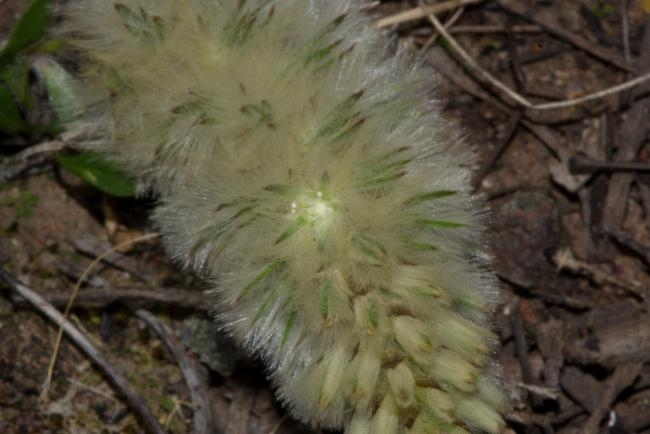Pussy Tails
(Ptilotus spathulatus)
Pussy Tails (Ptilotus spathulatus)
/
/

Tim Hammer
CC BY 4.0
Image By:
Tim Hammer
Recorded By:
Copyright:
CC BY 4.0
Copyright Notice:
Photo by: Tim Hammer | License Type: CC BY 4.0 | License URL: http://creativecommons.org/licenses/by/4.0/ | Occurence ID: https://www.gbif.org/occurrence/1836521524 | Publisher: Atlas of Living Australia |































Estimated Native Range
Summary
Ptilotus spathulatus, commonly known as Pussy Tails, is an evergreen perennial herb native to arid and semi-arid regions including grasslands, plains, and open woodlands in Australia. It is a low-growing plant, typically reaching a height and width of approximately 0.3 feet (0.09 meters) to 0.4 feet (0.1 meters). The plant forms dense clumps of soft, hairy leaves and is known for its distinctive flower spikes that resemble fluffy tails, with colors ranging from yellow to green, blooming in the spring and summer months. The flowers are quite showy and can add a unique texture to garden displays.
Pussy Tails is valued for its drought tolerance and unique floral display, making it an excellent choice for rock gardens, xeriscaping, and as a ground cover in areas with dry conditions. It thrives in full sun and requires minimal water once established, preferring well-drained soils. While it is relatively low-maintenance, it can be susceptible to root rot if overwatered or planted in poorly drained soils. Gardeners should be aware that Ptilotus spathulatus is not widely available in all regions, so sourcing plants or seeds may require some effort.CC BY-SA 4.0
Pussy Tails is valued for its drought tolerance and unique floral display, making it an excellent choice for rock gardens, xeriscaping, and as a ground cover in areas with dry conditions. It thrives in full sun and requires minimal water once established, preferring well-drained soils. While it is relatively low-maintenance, it can be susceptible to root rot if overwatered or planted in poorly drained soils. Gardeners should be aware that Ptilotus spathulatus is not widely available in all regions, so sourcing plants or seeds may require some effort.CC BY-SA 4.0
Plant Description
- Plant Type: Herb
- Height: 0.2-0.3 feet
- Width: 0.3-0.4 feet
- Growth Rate: Moderate
- Flower Color: Yellow, Green
- Flowering Season: Spring, Summer
- Leaf Retention: Evergreen
Growth Requirements
- Sun: Full Sun
- Water: Low
- Drainage: Fast
Common Uses
Drought Tolerant, Low Maintenance
Natural Habitat
native to arid and semi-arid regions including grasslands, plains, and open woodlands in Australia
Other Names
Common Names:
Scientific Names: , Ptilotus spathulatus, Trichinium spathulatum, Trichinium mucronatum,
GBIF Accepted Name: Ptilotus spathulatus (R.Br.) Poir.